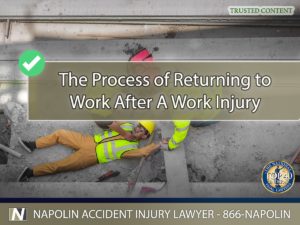The Process of Returning to Work After A California Work Injury
The aftermath of experiencing a workplace injury can be a pivotal moment for many employees, marking the beginning of a journey towards recovery and the eventual goal of returning to work. In the state of California, the law provides a structured pathway to facilitate this transition, ensuring that injured workers are supported both legally and financially through workers’ compensation benefits. Understanding the intricacies of these laws can empower employees to navigate their return to the workplace with confidence and security.
Understanding Workers’ Compensation in California
Workers’ compensation in California is designed as a mutually beneficial system that protects both employees and employers. For employees, it offers immediate medical coverage and financial support without the need to prove fault, ensuring that they can focus on their recovery. For employers, it provides a form of liability protection against personal injury lawsuits related to workplace injuries. Central to this system is the idea that employees should receive prompt and effective medical treatment, and when possible, support in returning to their roles or to suitable employment that accommodates any lasting impacts of their injury.

Key Aspects of California Workers’ Compensation Laws
Key Aspects of California Workers’ Compensation Laws
California’s approach to workers’ compensation is rooted in a comprehensive set of laws and regulations, prominently featured within the California Labor Code. These laws detail the requirements for employers to provide insurance coverage, outline the types of benefits available to injured workers, and establish the procedures for processing claims. Benefits under this system can include medical care, temporary disability benefits, permanent disability benefits, supplemental job displacement benefits, and death benefits. Understanding these provisions is crucial for injured workers as they plan their recovery and return to work.
Rights of Injured Workers in California
One of the cornerstone principles of California’s workers’ compensation laws is the protection of injured workers’ rights. This includes the right to receive medical treatment for work-related injuries or illnesses, the right to be compensated for lost wages during recovery, and the right to return to work after recovery. Importantly, California law also safeguards employees from being discriminated against or retaliated upon for filing a workers’ compensation claim. These protections ensure that injured workers can assert their rights without fear, seeking the support and accommodations necessary for their situation.

Returning to Work: What Injured Workers Need to Know
Returning to Work: What Injured Workers Need to Know
The process of returning to work after an injury is often marked by a period of adjustment and adaptation. Effective communication with employers about one’s medical status and work capabilities is essential during this time. Employees may need to negotiate modifications to their work environment or duties, based on medical recommendations. These accommodations might include altered work hours, physical adjustments to the workspace, or a temporary shift to less physically demanding tasks. The goal is to create a work scenario that accommodates the employee’s current physical capabilities while fostering their full recovery and reintegration into the workforce.
Legal Protections Against Discrimination and Retaliation
The Fair Employment and Housing Act (FEHA) plays a critical role in protecting the rights of injured workers in California. Under FEHA, employers are prohibited from discriminating against employees on the basis of disability, which includes injuries covered by workers’ compensation. Furthermore, the Act requires employers to engage in a timely, good faith interactive process to determine reasonable accommodations for employees returning to work after an injury. This framework ensures that returning workers are met with support rather than barriers, emphasizing the importance of their contribution to the workplace despite any limitations stemming from their injury.
Maximizing Your Workers’ Compensation Benefits
Maximizing the benefits of California’s workers’ compensation system requires an active and informed approach from injured workers. This involves diligently following medical advice, accurately documenting injuries and treatments, and effectively communicating needs and limitations to both healthcare providers and employers. Additionally, understanding the timeline and procedures for filing a claim can prevent delays in receiving benefits. For many, navigating the complexities of workers’ compensation claims and advocating for their rights can be challenging. In such instances, seeking the guidance of an experienced workers’ compensation attorney can provide invaluable support, ensuring that injured workers receive the full benefits to which they are entitled.

The Process of Returning to Work After A California Work Injury
The Process of Returning to Work After A California Work Injury
Reintegrating into the workplace after a work-related injury in California requires a comprehensive understanding of one’s rights and the available resources. While the journey may present challenges, the robust protections and supports offered by California law ensure that injured workers do not have to navigate this path alone. For those seeking further assistance or facing difficulties with their workers’ compensation claims, reaching out for legal support can make a significant difference. Injured workers are encouraged to contact Napolin Accident Injury Lawyer at (866)-NAPOLIN for a free consultation, where they can explore their options and seek expert guidance in securing the compensation and support they deserve for a successful return to work.
- Medical Liens in California Personal Injury Claims Explained - April 27, 2024
- Essential Tips for Bicycle Injury Prevention in California - April 27, 2024
- Understanding Who is Exempt from Workers’ Compensation in California - April 27, 2024
